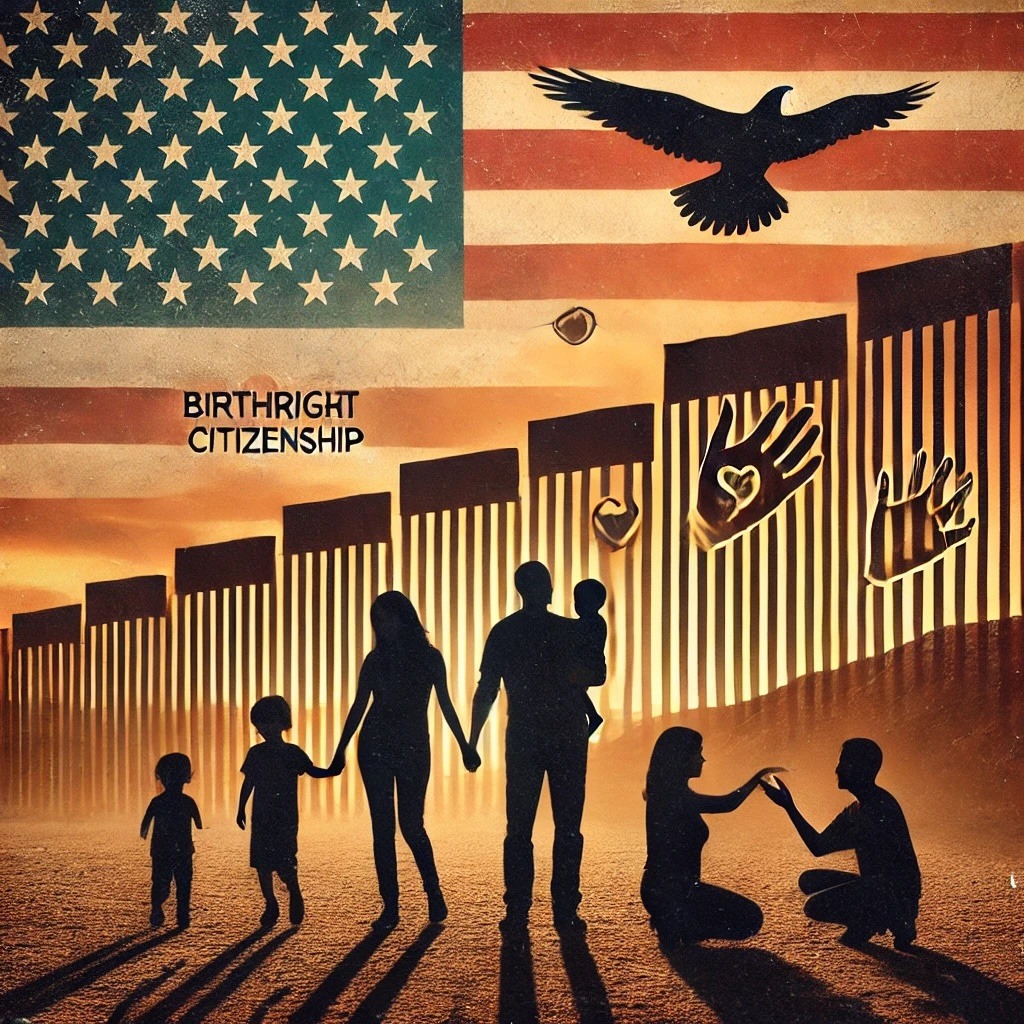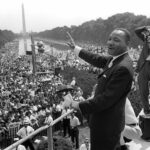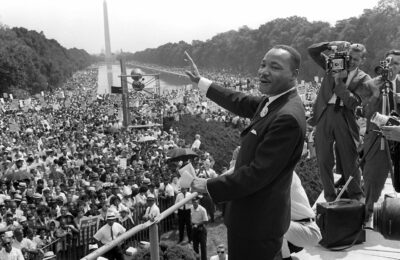The debate over birthright citizenship is not merely a legal or political issue—it is a deeply moral one that challenges us to consider the heart of justice, human dignity, and God’s call to love our neighbor. President Donald Trump’s recent executive order, aimed at limiting birthright citizenship for children of undocumented immigrants, raises profound questions about the meaning of citizenship and the obligations of a just society. To address these questions, we must look not only at the legal history of the Fourteenth Amendment and landmark cases like Dred Scott v. Sandford (1857) and United States v. Wong Kim Ark (1898) but also through the lens of Scripture.
For details on President Trump’s executive order, titled “Protecting the Meaning and Value of American Citizenship,” visit the White House website.
The Fourteenth Amendment: A Historical Foundation
The Fourteenth Amendment, ratified in 1868, was born out of the ashes of slavery and civil war. It was a bold declaration that citizenship and equality are not privileges reserved for the few but rights endowed by our Creator and protected by law. The Citizenship Clause reads:
“All persons born or naturalized in the United States, and subject to the jurisdiction thereof, are citizens of the United States and of the State wherein they reside.”
This was a direct response to the Supreme Court’s reprehensible ruling in Dred Scott v. Sandford (1857). In that case, Chief Justice Roger Taney declared that African Americans, whether enslaved or free, could not be citizens. This ruling denied the image of God in millions of people and entrenched the dehumanization of an entire race.
The Fourteenth Amendment overturned this injustice, proclaiming that anyone born on U.S. soil, regardless of race or parentage, is a citizen. It was a radical affirmation of human dignity rooted in the biblical truth that all people are created in God’s image (Genesis 1:27).
United States v. Wong Kim Ark (1898): Defending Birthright Citizenship
The Supreme Court’s decision in United States v. Wong Kim Ark (1898) reaffirmed the Fourteenth Amendment’s promise. Wong Kim Ark, born in San Francisco to Chinese parents, was denied reentry to the U.S. after a trip abroad because immigration officials argued he was not a citizen. The Court ruled in Wong’s favor, stating that the Fourteenth Amendment’s clear language guaranteed citizenship to anyone born on U.S. soil, with few exceptions such as children of diplomats or enemy occupiers.
This decision underscored the principle of jus soli (“right of the soil”), affirming that citizenship is based on birthplace rather than parentage. It was a victory for justice, but it also exposed the tensions that still exist today: How do we honor the rule of law while upholding the dignity of the vulnerable?
The Challenge of Open Borders and National Security
The ongoing crisis at the southern border has revealed the devastating consequences of open-border policies. An unsecured border has allowed criminal organizations, cartels, and traffickers to exploit vulnerabilities, leading to increased drug trafficking, human trafficking, and violence. The influx of fentanyl and other drugs has contributed to a national epidemic, devastating families and communities. These harsh realities underscore the urgent need for a secure border to protect our nation and its citizens.
Yet, as Christians, we must wrestle with the moral complexities of immigration. While we must uphold the rule of law and ensure national security, we are also called to love our neighbors and treat the sojourner with compassion. How do we reconcile these truths in a way that honors both justice and mercy?
Should Illegal Actions Result in Citizenship?
One of the most contentious questions in this debate is whether undocumented parents should benefit from their illegal actions by having their child granted U.S. citizenship. The Fourteenth Amendment guarantees citizenship to anyone born on American soil, but critics argue that this creates a perverse incentive for individuals to cross the border illegally.
From a legal perspective, the principle of jus soli has long been upheld, even in cases where the parents’ actions violated immigration law. But this does not erase the fact that those actions are illegal. As Christians, we must address the heart of the issue: How do we uphold justice without compromising compassion?
- The Rule of Law: Romans 13:1-7 calls us to submit to governing authorities and respect the law. Immigration laws exist to protect the sovereignty of a nation and ensure order. Parents who enter illegally violate these laws and must face consequences.
- Compassion for Families: At the same time, tearing families apart through harsh enforcement policies can have devastating consequences, particularly for children. Leviticus 19:34 reminds us to treat the stranger with love, recognizing that we too are sojourners on this earth.
- Balancing Security and Compassion: Policies should aim to secure the border while providing pathways to restoration for those already in the country. For undocumented parents, this could include opportunities to regularize their status if they meet certain criteria, such as contributing positively to their communities and avoiding criminal activity.
Practical Solutions for a Compassionate and Secure Border
To address these complex issues, we need policies that reflect both justice and mercy. Here are some principles that could guide a balanced approach:
- Strengthening Border Security: Invest in technology, personnel, and infrastructure to prevent illegal crossings and dismantle criminal networks. A secure border is essential to curbing drug trafficking, human trafficking, and cartel activity.
- Fair Immigration Processes: Reform the immigration system to make legal entry more accessible for those seeking work, refuge, or family reunification. A fair process reduces the incentive to cross illegally.
- Pathways to Legalization: For undocumented immigrants already in the U.S., provide pathways to legal status based on merit, contribution, and community ties. This approach ensures accountability while recognizing human dignity.
- Protecting Families: Develop policies that prioritize family unity and the well-being of children. Deportation decisions should weigh the impact on U.S.-citizen children and consider alternatives that preserve family integrity.
- Addressing Root Causes: Partner with neighboring countries to address the economic and social conditions driving migration. Investments in education, job creation, and security can reduce the push factors forcing people to flee their homes.
A Biblical Worldview: Justice, Mercy, and Human Dignity
As Christians, we must ground our understanding of citizenship and justice in God’s Word. The Bible offers clear principles that speak to this issue:
- The Image of God and Human Dignity: Every person, regardless of their status or origin, is made in God’s image (Genesis 1:27). This foundational truth demands that we treat all people with dignity and respect, including immigrants and their children.
- Care for the Foreigner: Scripture repeatedly calls us to care for the sojourner. Leviticus 19:34 commands, “You shall treat the stranger who sojourns with you as the native among you, and you shall love him as yourself, for you were strangers in the land of Egypt.” This is not a suggestion but a command, reflecting God’s own heart for the vulnerable.
- Justice and Mercy: Micah 6:8 reminds us of God’s call to “act justly, love mercy, and walk humbly with your God.” Justice requires upholding laws, but mercy calls us to temper those laws with compassion. The two are not mutually exclusive; they are the essence of God’s character.
- Allegiance to God Over Nationalism: Philippians 3:20 declares that our citizenship is in heaven. While we should strive to be good stewards of earthly governments, our ultimate allegiance is to God’s kingdom. This perspective challenges us to prioritize eternal values over political expediency.
A Call to Action: Upholding Justice and Compassion
The debate over birthright citizenship and immigration is not just about policy; it is about the soul of our nation. President Trump’s executive order presents an opportunity for Christians to lead with conviction and compassion. We must:
Pray for Our Leaders: Ask God to give wisdom to those in authority, that they may govern with justice and mercy (1 Timothy 2:1-2).
Advocate for the Vulnerable: Speak out for those who cannot defend themselves, remembering that Christ Himself was once a refugee (Matthew 2:13-15).
Model Christ’s Love: Let our actions reflect the grace we have received, offering hope and dignity to those on the margins.
Conclusion: A Higher Citizenship
As we wrestle with the complexities of birthright citizenship and border security, let us not lose sight of our higher calling. The Fourteenth Amendment, forged in the crucible of a divided nation, reflects a profound truth: Justice and equality are not privileges to be earned but gifts to be honored. As followers of Christ, we are called to be ambassadors of His kingdom, proclaiming the dignity of every person and the hope of the gospel.
Let us stand for justice, tempered with mercy, and work toward a society that reflects the heart of our Creator. For in the end, our true citizenship is not of this world but of heaven (Philippians 3:20).
References
Dred Scott v. Sandford, 60 U.S. 393 (1857).
Holy Bible, Legacy Standard Bible.
United States v. Wong Kim Ark, 169 U.S. 649 (1898).
“Fourteenth Amendment to the United States Constitution,” National Archives. https://www.archives.gov/founding-docs/amendments-11-27.
White House. (2025). Protecting the meaning and value of American citizenship. https://www.whitehouse.gov/presidential-actions/2025/01/protecting-the-meaning-and-value-of-american-citizenship/.






